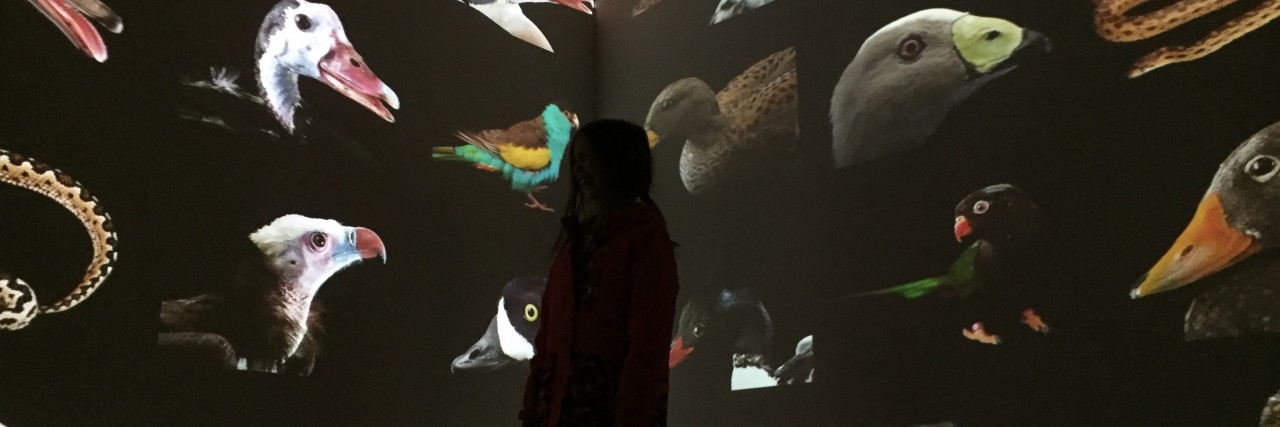Before my husband Rodney and I decided to have children, we met with a physician for counseling. I was worried about having a child given both our histories of anxiety and depression. Would the poor kid would be doomed? Do we have a child anyway? Would having a child be selfish? How can we create another person knowing her chances of being anxious and depressed could be pretty high?
While I don’t remember the exact conversation with the physician, he said any children we had could have a predisposition for anxiety or depression, meaning they would inherit the propensity for a those disorders, but full-blown depression or anxiety wasn’t a given.
Now, nearly 10 years later, my daughter Zora sits in front of me with a stomachache, glistening eyes, and a voice knotted with anxiety.
“I don’t want to play capture the flag at climbing camp,” she says in a scrunched up voice, her dark eyes buried under furrowed eyebrows.
“Why not?” I ask.
“Because I never get to climb on the wall. I just sit on the side!” she croaks angrily.
“Why?” I persist.
“Because there are always people ahead of me!” she says.
“Why don’t you push to the head of the line?” I ask.
“Because they won’t let me,” she answers.
Her dark red hair forms an angled curtain around her face. Her skinny arms wrap around her knees.
I try changing the subject. “Have you had breakfast?” When she’s anxious, she won’t eat. I was like that, too.
“No.”
“C’mon, then,” I say as I lean over to pick her up. She struggles in my arms, then grudgingly throws her arms around my neck.
“What am I going to do when you’re bigger than I am and I can’t pick you up?” I whisper into her ear as I carry her lanky frame into the kitchen.
After a bowl of dinosaur oatmeal and a glass of soy milk, we’re upstairs in her room picking out clothes. She flops on the mattress and looks at her feet.
“I still have a stomachache and I’ve eaten,” she announces.
“Look, next week I’m off and you don’t have camp. You don’t have to go anywhere. Won’t that be fun to look forward to?” I say.
Transitions are difficult for her. New situations are difficult for her. Asserting herself is difficult for her. There are expectations to meet, not only hers, which are likely high and unreasonable, but also what she perceives others may expect of her a.k.a. mind reading. Reminding myself what I think and feel may not always be real has always been a struggle for me, and I can see my little girl shares that propensity.
She nods, and we get on with the business of getting dressed. I kneel down beside her and pull a t-shirt over her head and mint green leggings over her feet and narrow hips. I grab her hand, and we head downstairs and out the door to camp.
Once in the car, Zora and Jasper request no music or NPR. They’re not bickering, which means that dark cloud of emotion has moved on. I relax and pull out of our street onto the main road.
“Next year, when I’m in fifth grade, can we get a fluffy dog?” she asks.
“We’ll get the dog that’s right for us at the right time,” I say. My response is maddeningly parental and noncommittal, so I add, “I read that cockapoos are good for kids.”
“What’s a cockapoo?” Zora asks. Jasper, who is four, snickers. I said “poo.”
“A cross between a cocker spaniel and a poodle,” I say. Then, knowing that silliness takes her out of negative place, I continue.
“So… you and Jasper are either,” I pause for a moment, thinking “‘Evodneys or ‘Rodvonnes — a combination of me and Daddy.” They giggle. “Which name is better?”
“Rodvonnes!” she’s taken the bait. We spend the rest of the trip to rock climbing camp describing the characteristics of Rodvonnes, everything from sensitivity to loud noises like toilets flushing in public restrooms (all Rodney) to wide, freckled noses (all me). And, I think to myself, the sensitivity and mood issues.
But so what? Yes, Zora is a genetic mashup of me and Rodney, but our own struggles with depression and anxiety aren’t her destiny. Zora is her own person: sensitive, anxious, change adverse, but also funny, creative, sarcastic, tenacious, and original. As her mom, I can’t mold her into less anxious, gregarious person. Changing her into something she’s not is a losing battle and a rejection of her unique talents. My job is to help her become and accept herself.
“Tell us more about the Rodvonnes, Mommy!” Zora urges me, as we pull into the parking lot at the camp. Yup. She’s excited about her own possibilities.
Follow this journey on JavaGrrlCafe.
We want to hear your story. Become a Mighty contributor here.

